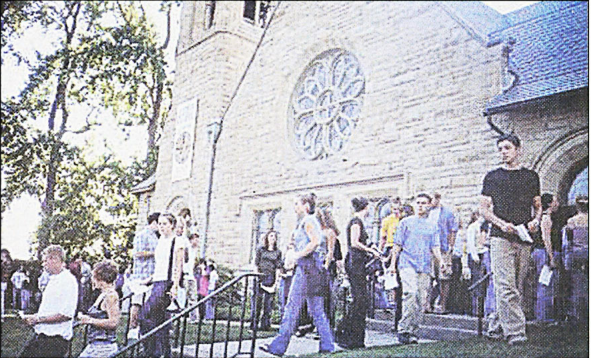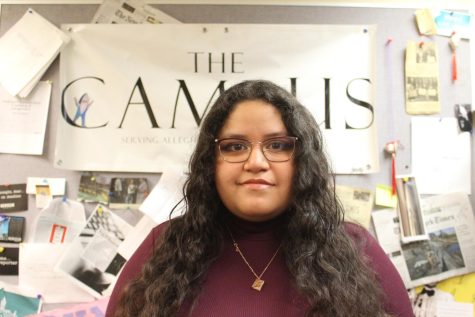‘Tuesday, Sept. 11 will be remembered by all’
A look back on The Campus coverage of 9/11, 20 years later

Students file out of Ford Chapel the afternoon of Sept. 11, 2001, after a memorial service for the victims of the day’s violence. This photo ran as the front-page photo of the Sept. 13, 2001 edition of The Campus.
On Tuesday, Sept. 11, 2001, a terrorist attack brought the World Trade Center down and sent shockwaves across the United States. Following the event, on Sept. 13, 2001, The Campus covered the impact it had on the student body and the actions faculty took to support students through a difficult time.
Provost Ron Cole reflected on the school’s immediate response to the tragedy. Cole was a professor at the time.
“There were a number of faculty and our counseling center that became very active, others in roles of support became active, in the Dean of Students office were several faculty who had training in crisis management,” Cole said.
Chaplain John Colatch, in a 2001 interview with The Campus, described the goal Spiritual Life had in supporting the student body after the attacks.
“We knew right away we had to provide an opportunity for the community to come together. We don’t have any answers, all we can do is come together,” Colatch said.
In its reporting at the time, The Campus emphasized the efforts students and faculty made to bring the community together in order to feel a sense of unity.
“Students packed into Ford Memorial Chapel Tuesday afternoon for a service of prayer and reflection, conducted by campus Chaplain John Colatch,” the Campus stated in the Sept. 13, 2001, issue. “The chapel, which seats 300, was filled to capacity, and still more students filled the foyer and spilled out onto the walkway.”
Students on campus all reacted differently and looked for ways to be brought closer together after the tragedy left many with a mix of emotions.
“I hope everyone maintains the feelings they had in that chapel throughout the days,” Michaels said. “I especially liked the message about not rushing to judgment and universal compassion. That’s important.”
The student body and faculty experienced a shift in the campus atmosphere and emotions.
“I just remember there being this shocked silence and somberness and then senses of fear about what was happening to the world,” Cole said. “After that, there was a lot of the campus community looking for ways to support each other.”
Students were asked by The Campus in September 2001 about the effect the attack had on their lives and the fear they felt.
“Mark Klarnan, a junior who lives in Long Island, N.Y., about 45 minutes from Manhattan, was also anxiously trying to call home to family, but couldn’t get through,” the Campus reported. “His mother works in a building on 34th Street, across from the Empire State Building.”
Rosa Diaz, ’02, , shared the personal impact the event had on her life and the lives of her loved ones in an interview with The Campus at the time.
“I have a friend who is a police officer who was on duty and is now missing,” Diaz said. “I’m devastated.”
In a “Viewpoint” section by Neetuh Sehghal, a former news editor, The Campus included insight on the effect outside news coverage of the terrorist attack was already starting to have on the lives of students of Asian and Middle Eastern descent.
“I spoke with about a dozen students on campus of Middle Eastern and Asian descent, are outraged at the media’s quick finger-pointing at the Islamic community,” Sehgal wrote in the Sept. 13, 2001, issue. “I worry that the media is affecting the mindset of the people and brainwashing them to think that their friends and neighbors may actually be terrorists or somehow linked to such horrible activities, just because of where they come from.”
Cole recalled the aftermath of the events in relation to the Muslim community on campus and the coversations that were had about it.
“Some of the conversations were structured around how we best support those in the Muslim community,” Cole said. “I recall the event left some in the community at a loss for understanding how religion and spirituality affect them in the world in a different way. We sort of gravitated pretty quickly to how to show solidarity and support for people in the Muslim faith who were starting to become singled out in different parts of the country.”
The Campus concluded the article with a final statement on the impact that will follow the terrorist attack and the effect it will have in history:
“Whatever the response, the terrorism on Tuesday, Sept. 11 will be remembered by all.”
In a 2001 interview with The Campus, then Dean of the College Lloyd Michaels remarked on the diversity of emotions students felt and how the service at Ford Chapel helped people process the events.

Evelyn Zavala is a senior from San Francisco. She is majoring in Business and minoring in Journalism in the Public Interest. This is her fourth year on...








